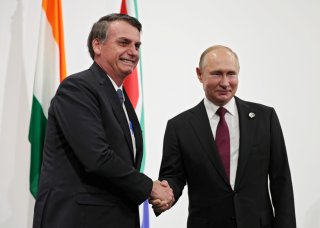Why Brazil and Argentina Chose Russia Over Ukraine
Brazil and Argentina’s handling of the Ukraine crisis will have to be chalked up as one more lost opportunity among many that have gone by before.
Bolsonaro’s reference to the importance of Russian (and by extension Belarusian) fertilizer is not wholly invented. A large portion of Brazil’s fertilizer is sourced internationally, and these countries are major players in global markets. And politically, Brazilian agribusiness has been a major source of financial and political support for Bolsonaro. Undoubtedly, without Russian fertilizer available global prices will rise.
Still Brazil, with its highly efficient export-oriented agricultural sector, is in a far better position to deal with any shortage than many other countries. By making this issue part of his discourse, Bolsonaro cut against Brazil’s longstanding desire to be taken seriously as a major international force. To have said that Brazil, because of its dependence on fertilizer, could not take a position on a global question of burning significance seems particularly embarrassing for a country which long has prided itself in its sophisticated diplomacy.
If Brazil’s Bolsonaro takes a position and stays with it well after it has proven to be unviable, Argentina’s Fernandez tends to sway with the wind like a weathervane, with domestic political considerations always of far more importance than long-term foreign policy goals. The domestic context for Fernandez is his painful need to negotiate and implement a repayment plan for Argentina’s debt to the IMF, an entity which is regarded with hostility by large portions of Argentine society and especially among his own Peronists. Given that the IMF is viewed almost interchangeably with the United States, visiting Putin was a way for Fernandez to shore up his position with the Left and demonstrate his independence from Washington.
Also, prior to his travel, it was understood that Fernandez might use the trip to seek additional alternative funding, such as a loan from Russia of its special drawing rights at the IMF to shore up Argentina’s reserves. This does not appear to have gone anywhere and no announcements related to this were made. China was Fernandez’s next stop, and while the Chinese made no effort to take on the burden of lending to Argentina, a few somewhat more plausible announcements of possible investments were made, most notably for Chinese funding for the construction of a third reactor at the Atucha nuclear power complex near Buenos Aires.
When Russia invaded, dithering became the order of the day, with lengthy silences on Fernandez’s part followed by weak statements from the Foreign Ministry. The fact that Argentines looked to Vice President Kirchner’s statements as much or more than Fernandez’s only served to point out his politically weak position.
It was not until March 1 that Fernandez himself publicly condemned the invasion, though without mentioning Putin by name. When Argentina ultimately voted with the overwhelming majority of nations to condemn Russia at the United Nations General Assembly, Foreign Minister Santiago Cafiero took pains to say that this vote “does not constitute an alignment with NATO or an abandonment of neutrality. The only alignment which Argentina has is with the interests of Argentines.”
Argentina and Brazil’s behavior in the face of Russia’s actions was marked by incoherence with short-term domestic political advantage always in the foreground. This is not to say that every nation’s calculus will inevitably lead it to rapid, close alignment with Ukraine, the United States, and NATO. It is easy to figure out why some countries have refused to break with Moscow. China, of course, is playing a long game in a bid for an ever more powerful global position. Staying close to Russia is part of its strategy.
India has a longstanding relationship with Russia, a major arms supplier; while it has begun to diversify, including strengthening ties with the United States, it is unwilling to cut its existing links. Israel, which might otherwise be vocally supportive of Ukraine in the face of aggression, has been cautious, too, as it needs to maintain a working relationship with Russia that allows it to deconflict with Russian forces when it attacks Iranian/Hezbollah targets in Syria. Within Latin America, Cuba, Nicaragua, and Venezuela have counted on Russian support for years.
Despite Bolsonaro’s claims regarding fertilizer, it is hard to see either the Brazilian or Argentine stances as more than political posturing mixed with amateurish improvisation after the fact. In global capitals, the verdict their leaders will face will be one that they and their predecessors have endured on many occasions before: These simply are not serious people. For Brazil, which looks to a future when it joins the world’s great powers, and for Argentina, which remembers a past when it once seemed about to join the ranks of the wealthy and important, their handling of the Ukraine crisis will have to be chalked up as one more lost opportunity among many that have gone by before.
Richard M. Sanders is a Global Fellow of the Woodrow Wilson International Center for Scholars. Formerly a member of the Senior Foreign Service of the U.S. Department of State, he served as Argentina desk officer from 1997 to 1999 and as the Director of the Office of Brazilian and Southern Cone Affairs from 2013 to 2016.
Image: Reuters.

